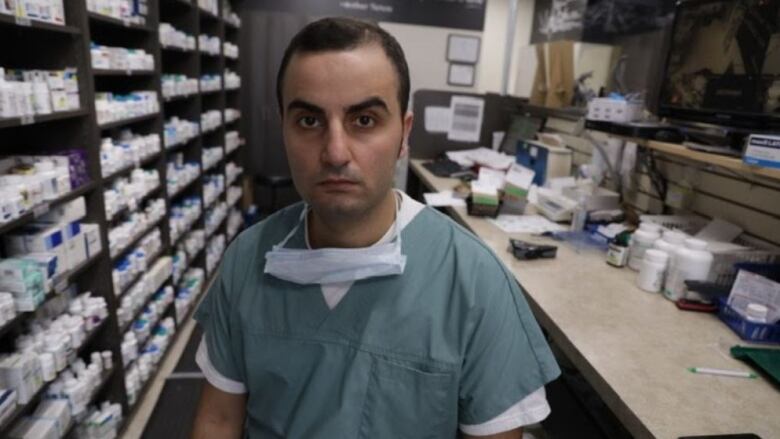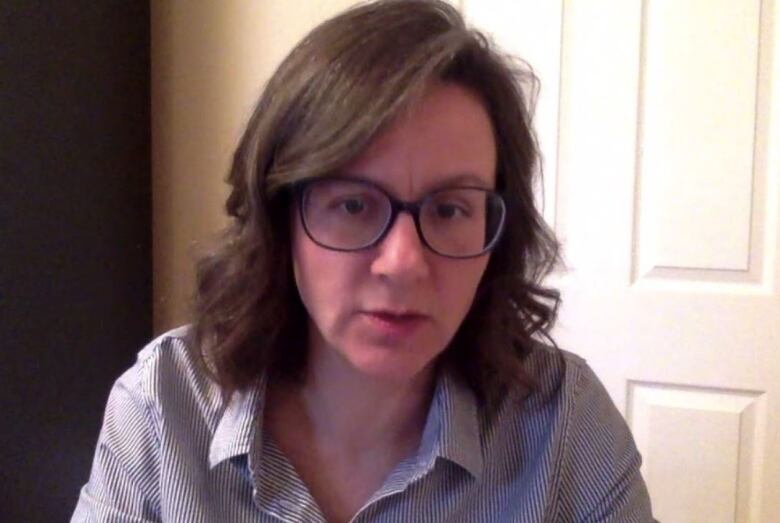Pharmacists struggle to fill gaps in strained health-care system
Some provinces looking at easing regulations, allowing pharmacists to expand duties during pandemic

Some Canadian pharmacists say they are struggling to fill gaps in a strained health-care system, leaving them to deal with a lot of patients who are anxious to avoid medical clinics and the ER.
The patients, they say, are calling or comingto pharmacies looking for easily accessible or face-to-face medical advice at a time when many medical clinics aren't allowing walk-ins and physicians are doing some assessments over the phone or online.
"[I'm] having to do everything from bandaging up a patient that opened up his head and started bleeding and didn't want to go to emerg all the way to talking someone down from committing suicide. And that's just me. My colleagues have plenty of stories," saidToronto pharmacist Kyrollos Maseh.
Maseh saidhe's usingadditional traininghe has in areas such as first aid and psychopharmacology to help patients whom he would normally refer to emergency rooms since pharmacists aren't typically trained to do those things.
Many pharmacies, including his own, are also struggling to get the medications they need to fill prescriptions and to keep the staff they need to function, he said.
"A lot of staff members right now either have to be in quarantine or, I had one in my case, she could not mentally handle the situation [she was] too anxiousso she opted to stay home."
WATCH | A pharmacist describes how his work has changed during the pandemic:
The situations for pharmacists differ from province to province, said Kelly Grindrod, anassociate professor in the school of pharmacy atthe University of Waterloo.
But Grindrod saidshe is seeing common themes: pharmacists who are feeling overwhelmed, constantly feeling exposed to people who may be carriers of the virus, struggling to fill prescriptions and even living separately from their families as a safety measure.
Support and exhaustion
"On the one hand, pharmacistsare so happy to be there for their patients, to be on the front line to provide that support. On the other hand ... I think there's a lot ofexhaustion and burnout,"Grindrodsaid.
Pharmacist Tamara Awada from the small community of Constance Bay, in rural west Ottawa, has her own challenges.
Over the past few years, her community was hit by a tornado in September 2018, a flood in April 2019and now the pandemic.

Awada saidshe's dealing with extra work and extra costssuch as having to buy personal protective equipment (PPE) for herself and her staff.
She saidmore than half of the patients who contact her are looking for advice or"need to be comforted." Others, she said, want PPEs for immunocompromised family members or are having difficulty accessing their physicians.
"This is extra pressure put on usand gets us exposed to more elementsand more at risk," she said.
But Awada isdetermined to stay optimistic. "This is the reality. We can get through this together."
Regulations loosened
Despite the problems caused by the pandemic, many pharmacists say they are willing to do more, and it looks like that may happen.
Some provinces are starting to loosen regulations around what pharmacists can do without a doctor's approval.
That change is in the stakeholder feedback stage,Denelle Balfour, a media relations officer withOntario's Ministry of Health, said in an email to CBC News.
Alsoin response to COVID-19, Health Canada relaxed restrictions around controlled drugs and narcotics like fentanyl and morphine. Individual provinces and pharmacists' associations are now deciding what that will mean in their jurisdiction.
Ontario is allowing its pharmacists to transfer, renew and adapt prescriptions for controlled substances and accept a verbal order for those types of drugs from doctors.
In Newfoundland and Labrador, pharmacists can also now transfer prescriptions for controlled substances to other pharmacists within the provinceand pharmacy employees can now deliver those prescriptions to patients'homes.
Lack of PPEfor pharmacists changing, too
In an open letter to the federal government dated March 18, the Canadian Pharmacists Association raised concerns about the lack of PPE being supplied to pharmacists.
"Pharmacists are the most accessible health-care providers and the first and most frequent point of contact for many Canadians," the letter says, "particularly those with chronic disease and other risk factors that make them more vulnerable to the effects of infection with COVID-19."
Health Canada toldCBC News sincepharmacists are governed by the provinces, it's up to them to decide who whether pharmacists would get theprotection.

Many provinces, including Nova Scotia and Ontario, where both Awada and Maseh work,do not provide protective equipment to pharmacists.
"We value the role of pharmacists and the work they do to keep Ontarians healthy,"Balfour said. "[But]the global supply chain for personal protective equipment is extremely strained right now as all jurisdictions face challenges in procuring supplies."
Manitoba provides PPEs only to pharmacists working in acute or long-term care facilities.
PPE for some pharmacists
But other provinces, including New Brunswick and Alberta, say they will soon start providing PPE to pharmacists and pharmacy technicians with the help of their provincial pharmacists' associations.
New Brunswick says that will happen in the "coming days." Alberta says the protective equipment is being shipped and"will be distributed as soon as possible."

Grindrod saidthat's what needs to happen across the country.
- Tracking the Coronavirus: See the latest numbers and need to know information here
- See how Canada compares to the rest of the world when it comes to coronavirus pandemic
"The key seems to be remembering pharmacists are a front-line health-care worker, so when it comes to planning or PPE, or child-care services or COVIDtesting,many times pharmacists are not included," she said.
The other provinces and territories didn't respond to CBC's questions about PPEs by deadline.














_(720p).jpg)


 OFFICIAL HD MUSIC VIDEO.jpg)
.jpg)



























































































